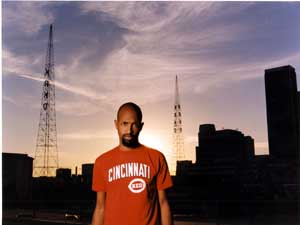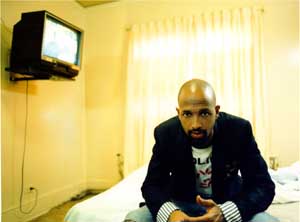-
- Calif. Senate passes domestic partners bill
- Kansas City approves minimal domestic partner benefits
- Wyoming resident charged with stalking gay man
- Two plead guilty in assault, robbery of WeHo man
- U.S. attorney: no evidence church fire is a hate crime
- Bishops may endorse gay marriage ban
- No prosecution in lesbian arson case
- Lesbian couple protests school’s decision
- Poll: Californians divided on gay marriage
- Study of interrupted drug treatment complete
- National News Briefs
- World News Briefs
Arts & Entertainment
Sacred and human: an interview with Kenna
Ethiopian-born artist to perform with Fischerspooner, Sept. 17
Published Thursday, 04-Sep-2003 in issue 819
With his debut disc New Sacred Cow (Columbia), Kenna could easily surpass the electroclash crowd and be crowned of the next wave of new wave. From the insistent beat of “Freetime,” which sounds like he’s going for a drive in Gary Numan’s car, and the near-dub of “Man Fading,” to the vexing glory of “Vexed And Glorious” and the unexpectedly gorgeous “Yeneh Ababa (Rose),” Kenna is his own man, and could potentially inspire imitators. A riveting live performer, Kenna is currently on tour and will be opening for Fischerspooner at 4th&B, Wednesday, Sept. 17. The Gay and Lesbian Times recently spoke with Kenna about his music and the tour.
Gay and Lesbian Times: When I saw you perform live at Schuba’s in Chicago in June (2003), you were like a man possessed, moving in a very uninhibited manner on stage, and your enthusiasm was infectious, judging by the crowd’s response. Did you always move that way, or did you start out as one of those performers who stands in front of the microphone with his eyes closed when he sang?
Kenna: That show that I did at Schuba’s was the eighth show I’ve ever done…. So, I guess the answer is I’ve always been that kind of performer (laughs).
GLT: Who or what is the “new sacred cow” that you refer to in the title of your album?
K: The “new sacred cow” is self. So, I guess it’s a who and a what (laughs). The album is about the rise of individualism and about control. It’s a battle; it’s the war for self-control — the idea that within myself I’ve had so many battles to find peace of mind and find where my powers lie. What are my strengths, weaknesses, insecurities?
GLT: Does it ever feel like you are singing into the void or do you feel like you are being heard?
K: Sometimes I really do feel like I am singing into the void, but I wonder (about) what we perceive as the void. There’s so much that we don’t understand. I feel like singing into the void is actually where I should be singing, and not necessarily to be understood. I hope that people will stumble upon the words and find the meaning and possibly find themselves in me, but at the end of the day, I’m just trying to find myself.
GLT: Speaking of finding yourself, “Hell Bent” sounds like the kind of song that was written from personal experience.
“I’m comfortable knowing that I’m dysfunctional and that I’m a broken human being and there are some pieces I will never be able to put together.” K: Absolutely.
GLT: What was the inspiration for that song?
K: That’s an interesting song. I was born in Ethiopia and after six months my parents had to leave me there and go to Cambridge. There was an overthrow of the government. My grandfather was a Korean War veteran and my parents left me with him. I was the first-born male grandchild of a 20-person family. I was a very important child (for my family). Living in Ethiopia for my first couple of years, without my parents, I had horses and nannies. I had a kingdom. When it was time to go and meet my parents — my dad had gone to Cincinnati to study for his doctorate at University of Cincinnati, and my mom was working there as well — I came to Cincinnati to a one-bedroom student apartment.
GLT: Culture shock!
K: My bedroom was the closet. My dad was reading Curious George books to me to force me to learn English. I didn’t understand a word that he was saying. It was an unbelievable moment in my life where I can remember, at three years old, when the authority complex, my control issues and my compulsive nature hit. It’s that lyric, “Am I the king,” that starts the song “Hell Bent” and references, was I the king or did I lose my kingdom…. I began, at that moment, to realize that I would have to fight for whatever it is that I used to have.
GLT: In the song “I’m Gone,” you sing about being “nervous and wasted thankfully” and your music publishing and production company is called Nervous People. Are you nervous?
K: (Laughs) Yeah. Aren’t we all? That’s why it’s called Nervous People. I’m looking for my tribe. I think the world is full of nervous people and I am one of them. I’m comfortable knowing that I’m dysfunctional and that I’m a broken human being and there are some pieces I will never be able to put together. This music and my life is a part of that search to be the very best human being I can be. But at the same time impart some kind of understanding to others that it’s all right to be nervous and wasted and numb. It’s all right to be all those things because it is just how you feel at the moment and I’m sure that the feelings will come that will make sense to you when it’s supposed to. It’s like putting out this record. It came out when it was supposed to come out. It didn’t come out a minute before or a minute after. I’m comfortable knowing that the time that I spent was to teach me patience, not necessarily that the time that I spent was time lost.
GLT: Speaking of timing, the new-wave style of “Freetime” couldn’t have come at a better time, considering the new-wave revival in the form of the electroclash scene. Where do you see your place in that musical movement?
K: I don’t know. I have to say that that movement is interesting to me. I never did the music to pick up the eighties torch. I wrote the record because of how I was influenced and who I am. I think a lot of bands, right now, are saying “That’s a music that meant something to me then and I’m going to replicate it now. I didn’t do it for that reason. Chad (Hugo) and I wanted to make a record that was timeless and has no boundaries upon what it sounds like. I think that “I’m Gone” and “New Sacred Cow” are really strong references to our Beatles influences. There are other songs on the album that reference the late ’60s and early ’70s. There are melodies that are influenced by everyone from Sam Cooke to Bono. I would be lucky to be able to be perceived as one of those characters, a Bono or a Michael Stipe or a David Byrne. Those are the realms I come from. The Kraftwerks and the Cars of the world. I’m into that music. The Beatles especially….
GLT: The remixes of “Freetime,” especially the one by Junior Vasquez almost guarantees you exposure to a wider gay, club-going audience. How do you feel about that?
K: I want the music to be heard by everyone. I don’t do anything specifically for any sect or group. I don’t believe in that. I believe that we are one people. This is one world. I’m happy that Junior was asked to do it for us. The label made that suggestion and I went with it. That Junior was a part of it — it was meant to happen. But I never specifically thought of one group of people as more apt to my album because of it.
|
|
Copyright © 2003-2025 Uptown Publications



